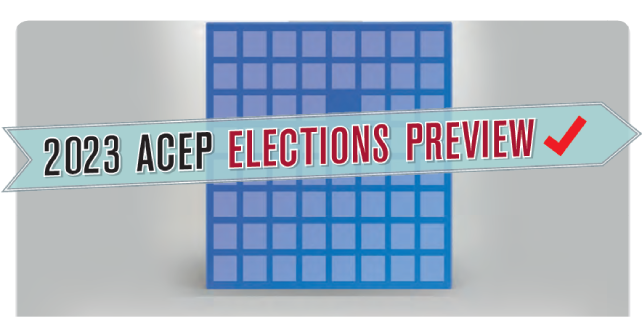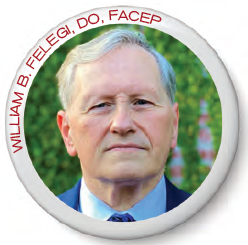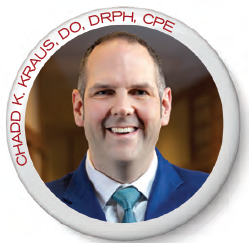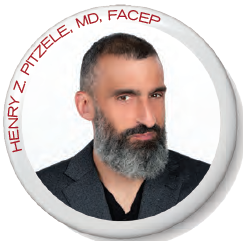
Each year, ACEP’s Council elects new leaders for the College at its meeting. The Council, which represents all 53 chapters, 40 sections of membership, the Association of Academic Chairs of Emergency Medicine, the Council of Emergency Medicine Residency Directors, the Emergency Medicine Residents’ Association, and the Society for Academic Emergency Medicine, will elect four members to the ACEP Board of Directors when it meets in October. Let’s meet the candidates for the Board of Directors.
Explore This Issue
ACEP Now: Vol 42 – No 07 – July 2023QUESTION FOR THE CANDIDATES: What would you do to ensure that emergency medicine remains an attractive specialty?
 William B. Felegi, DO, FACEP
William B. Felegi, DO, FACEP
(New Jersey)
Current Professional Positions: Medical director, Van Buren County Hospital emergency department and Van Buren County Hospital ambulance, Keosauqua, Iowa; EMS medical director, Farmington Ambulance; medical director, Atlantic Health, Morristown Medical Center, Travel MD, Corporate Health
Internships and Residency: Emergency medicine residency, Morristown Memorial Hospital, Morristown, New Jersey
Medical Degree: DO, University of New England College of Osteopathic Medicine, Biddeford, Maine (1989)
Response
With the decline in applicants for emergency medicine residencies, the number of physicians either retiring or deciding to leave our field to pursue other interests, and our aging workforce, it is imperative that we prioritize making emergency medicine attractive for a rewarding career. We must focus on exploring why individuals have lost interest in our specialty and why practicing physicians have left to pursue other interests.
We can make some assumptions as to why our specialty has become less attractive and why physicians are leaving or retiring early. Our work can be very rewarding, whether we resuscitate a cardiac arrest patient who is discharged neurologically intact, save the life of a badly injured individual, or render pain control to a child with an earache. During COVID, we were heroes. But after COVID, many physicians felt physically and emotionally exhausted due to the volume of patients, high acuity, and the lack of supplies, medication, etc.
Post-COVID, some of our partners left. More importantly, nurses and ancillary care professionals left, which led to increased overcrowding, closure of inpatient beds, and a further lack of resources. I read an article where a physician thought that we could offer a fellowship in emergency “hallway” medicine. I did appreciate the satire, but the reality is, in many emergency departments, we do practice hallway medicine that frequently results in sub-optimal care and leads to poor patient outcomes and experiences for not only the patient, but also their families.
Evidence suggests that physicians would rather have better working conditions than additional income. Yes, fair reimbursement is important, but it may not be the primary driver for dissatisfaction. Unless we focus on the quality of work life for all of us, more individuals will no longer want to practice our specialty. Better work life equals better personal life where you can enjoy more personal freedom and rejuvenation.
ACEP needs to continue to advocate for better working conditions. We have always been the saviors because of a fragmented and broken health care delivery system, but our specialty continues to suffer. We need to be more forceful and vocal in advocating for drastic reforms. Why do we think that long waits resulting in deaths and delays in care, hallway medicine, overcrowding, longer turnaround times, left-without-being-seen rates, the lack of resources especially in rural hospitals, and the difficulty in finding a bed for a transfer patient is acceptable?
No elected official or VIP who comes to an ED would have to endure what our patients experience. VIPs always go to the front of the line. We need to stand firm and aggressively advocate for change. This is not an easy task, but I fear that unless we improve our work life, we will lose more physicians to attrition and less students will join our specialty. This will have an even greater impact on emergency medicine and lead to a further decrease in our membership, which will ultimately make it harder for our organization to survive.
 Robert J. Hancock, DO, FACEP
Robert J. Hancock, DO, FACEP
(Texas)
Current Professional Positions: Clinical assistant professor, Oklahoma State University Center for Health Sciences, Comanche County Emergency Medicine Residency Program; attending emergency physician, Comanche County Memorial Hospital; attending emergency physician, Northwest Texas Medical Center
Internships and Residency: Emergency medicine residency, Parkland Hospital, Dallas, Texas (2007)
Medical Degree: DO, University of North Texas Health Science Center (2004)
Response
The decline in the popularity of emergency medicine and the subsequent significant decline in the Match statistics should be very concerning for all of us. The underlying causes of the decline are multifactorial, and many were significantly worsened during COVID.
The issue with boarding evolved into a crisis during COVID. This required many of us to see a significant percentage of our patients in the waiting room or hallway chairs. While this was a necessity during COVID, it definitely had a negative impact on medical students during rotations. I actually had several medical students tell me that they did not want to train and practice under those conditions. This resulted in many students choosing specialties that were in a more controlled environment with fewer variables.
While many of us were initially treated as “health care heroes” during COVID, this quickly deteriorated into angry patients and families who vented their frustration at the emergency department staff. The increase in hostility and workplace violence also has driven medical students to reconsider if emergency medicine is truly their calling. I have had medical students tell me they were leaning away from emergency medicine because of safety concerns.
The COVID pandemic also exposed massive holes in the “health care safety net.” For those of us who work in critical access hospitals with variable specialty coverage, COVID created massive patient safety issues. Every facility cited “capacity” and was blanketly declining every transfer unless it was trauma, STEMI, or stroke. In many cases, patients deteriorated and died from conditions requiring specialists while we begged for anyone to help. Medical students witnessed our absolute frustration with the system, and I am certain it made them question their decision to pursue emergency medicine.
ACEP is already taking steps to address boarding and workplace violence. However, I still think there is much more that can be done, and these are two issues that we must continue to pursue through advocacy and legislation. Additionally, I feel ACEP should lead the way on pursuing revisions to EMTALA that would update an outdated statute and guarantee that critically ill patients have access to definitive care.
Unfortunately, these issues have also caused many emergency physicians to become frustrated and speak negatively in front of medical students. It is imperative that we not only work to fix these issues, but also encourage our members to support our specialty and attract quality candidates for emergency medicine. They are the future of emergency medicine!
 Chadd K. Kraus, DO, DrPH, CPE, FACEP
Chadd K. Kraus, DO, DrPH, CPE, FACEP
(Pennsylvania)
Current Professional Positions: Attending emergency physician and system director for EM research, Geisinger Medical Center; director of research, American Board of Emergency Medicine (ABEM)
Internships and Residency: Emergency medicine residency, Lehigh Valley Network, Allentown, Pennsylvania (2014)
Medical Degree: DO, Philadelphia College of Osteopathic Medicine, Philadelphia
Response
Aside from our founding, this is the most exciting time in the history of emergency medicine—a time of volatility, uncertainty, complexity, and ambiguity—a time for us, as emergency physicians, to forge a bright future to become the most attractive specialty. Together, we have navigated turbulent times the last few years. Uplifted by public cheers during COVID’s peak, now we are burdened by a broken system. Boarded inpatients, inadequate resources for patients with psychiatric needs, violence against emergency physicians and ED staff, payers refusing to fairly reimburse us, and non-physicians maneuvering for independent practice, have left us feeling unappreciated, morally injured, and ready to quit what feels like an unsustainable career. As an associate residency program director during the 2022 and 2023 Match, I experienced the impact of these headwinds firsthand. And, contrary to exaggerated media reports claiming that emergency medicine is “no longer cool” to medical students, we can become the most attractive specialty by being adaptable, accessible, and engaged. I pledge to be these three things for you as an ACEP Board member.
Adaptable. Leadership expert John Maxwell says, “The pessimist complains about the wind, the optimist expects it to change, the leader adjusts the sails.” Adaptability is key to our success—in developing novel practice models extending care beyond the walls of the ED, in embracing new definitions of a career in emergency medicine, in creating value for alternative payment models, and in rightsizing our workforce.
Accessible. Care delivered 24/7/365, “no shoes, no shirt, no problem”—this is us; this is emergency medicine. As an emergency physician who lives and works in rural Pennsylvania, I can confirm that emergency physicians are the cornerstone of care in low-resource settings. Rural EDs can be incubators of innovation that serve as examples of accessible emergency care in every community. In keeping emergency medicine attractive, we will reimagine the delivery of acute, unscheduled, “no wrong door” care, while creating satisfying, desirable, and fulfilling careers for emergency physicians.
Engaged. Our engagement in advocacy, particularly at the local and state levels where employers and legislators influence how we deliver care, is critical to building a viable and sustainable workplace—a practice environment with adequate staffing, emergency physician-led teams, fair employment policies, provisions for our wellness, and functional clinical processes. All emergency physicians benefit from ACEP’s success. Our voices are amplified, and we achieve more when we support one another as members of the ACEP community. Together, we shoulder our burdens and celebrate our victories as emergency physicians.
What we do matters, and the good that we do is why emergency medicine has been, and can be, the most attractive specialty. Now is the time to adjust the sails. In doing so, we will reach the greater heights for emergency medicine that patients and the public need and that we, as emergency physicians, deserve.
 Abhi Mehrotra, MD, MBA, FACEP
Abhi Mehrotra, MD, MBA, FACEP
(North Carolina)
Current Professional Positions: Vice chair, strategic operations, and clinical professor for the Department of Emergency Medicine, University of North Carolina; adjunct professor, Kenan-Flagler Business School, University of North Carolina
Internships and Residency: Emergency medicine residency, University of North Carolina Hospitals, Chapel Hill, NC (2003)
Medical Degree: MD, The Ohio State University College of Medicine and Public Health, Columbus, Ohio
Response
To ensure that emergency medicine remains an attractive specialty, several strategies can be implemented. First, it is important that we acknowledge and address the current challenges faced by our specialty. These include factors like the No Surprises Act, workforce shortages, hospital capacity concerns, and scope of practice. By recognizing these issues, we can work toward finding solutions that improve our practice environment and make emergency medicine more appealing.
One way to refocus on the joy of medicine is by emphasizing the sanctity of the physician-patient relationship. This core aspect of EM can bring fulfillment to emergency physicians and remind us of the meaningful impact we have on patients‘ lives. By nurturing this relationship, we can reignite the passion and sense of purpose of why we chose this specialty.
Advocacy efforts should continue to address issues like the No Surprises Act (NSA) and other regulatory barriers that affect emergency medicine, ensuring that we continue to highlight workplace violence, boarding, and behavioral health resource constraints. By actively engaging in advocacy, we can influence policy decisions that positively impact our specialty and create a more favorable working environment.
While projecting the future workforce is important, it is crucial that we acknowledge the uncertainties associated with such predictions. It is essential to adapt recommendations to the current situation, considering factors such as changing demographics, COVID effects, technological advancements, and evolving health care delivery models. By remaining flexible and open to change, we can better address the needs of our colleagues and patients and ensure the specialty remains attractive.
ACEP should rededicate itself to the well-being and development of emergency physicians. This can be achieved through expanding the ongoing efforts, such as consultation services and providing support at each career stage—residency, early practice, mid-career, and exploring retirement. By offering guidance and resources, ACEP can help emergency physicians navigate our professional journeys, enhancing job satisfaction and retention.
As health care delivery evolves, it is important to emphasize the core of emergency medicine, which is acute and unscheduled care. No one else does this better than we do! Collaborating with thought leaders in areas such as telehealth, clinical decision support, and emergency preparedness can provide new opportunities for emergency physicians. By actively participating in these emerging fields, emergency medicine can continue to grow and remain relevant in the changing health care landscape.
Ultimately, our focus should be on what is best for both emergency physicians and the specialty itself. ACEP should prioritize initiatives that support the well-being and satisfaction of emergency physicians and physician-led teams. Students and residents need to see the enthusiasm and enjoyment within the specialty, which can help attract the next generation of emergency physicians. By showcasing the rewards and fulfillment of emergency medicine, we can ensure its attractiveness as a specialty for years to come.
 Henry Z. Pitzele, MD, FACEP
Henry Z. Pitzele, MD, FACEP
(Illinois)
Current Professional Positions: Chief informatics officer and attending physician, Jesse Brown VA Medical Center and Advocate Illinois Masonic Medical Center, Chicago; attending physician, Mesa View Regional Medical Center, Mesquite, Nevada; attending physician, Advocate Illinois Masonic Medical Center, Chicago
Internships and Residency: emergency medicine residency, University of Illinois at Chicago (2023)
Medical Degree: MD, University of Illinois at Chicago College of Medicine (2000)
Response
There are some elements of EM which have always made our specialty attractive—our ability to truly care for people in their time of need, to take care of anything and anyone, any time, in any place, and the freedom to do so in discrete and prescheduled shifts. The attractive elements have not changed, and will not—but the last two Matches show that the outlook on the future of EM has changed, and ACEP can and must focus our most fundamental organs—those of advocacy and communication—towards even stronger defenses of workforce, autonomy, compensation, and community.
Our efforts on workforce are ongoing, but we can do even more—we have engaged the greater EM community and the ACGME, but exploring other partnerships (such as ABEM) can help us further demonstrate the value of EPs. More resources for public relations and increased support for definitive, original research could further bolster the greater public acceptance of the obvious good of physician-led teams. But where we excel, and where we can really create change, is in DC; it is time to commit to legislation regarding GME funding, which will help us not only with supply-side workforce increases, but also with distributive imbalances (urban vs. rural). Workforce cannot be an afterthought for the College.
While on the topic of legislative advocacy, it is time to legitimately explore legislation to end the Medicare funding cycle. ACEP is the only EM organization who has (and who can) step up and fight for our compensation from CMS, but every year at LAC, I sit in congressional offices describing our ever-decreasing compensation, and hear the same refrain from lawmakers: “This isn’t a good year to talk about this.” Well, given the state of EM recruiting, this must be the year we talk about permanent legislation for Medicare increases.
We must also continue (and amplify) our fight against consolidation. Our March letter to the FTC decrying non-competes and our April letter to CMS about ownership disclosures were just an opening salvo—our attractiveness as a specialty will continue to plummet if the frontline EPs’ sense of autonomy continues to erode, and EM consolidation is a direct cause of this erosion. We need to not only work against consolidation through our governmental interfaces, but in our own business practices as well.
Finally, the College needs to put more resources into our core function of providing community. Not only must we do a better job of communicating the immense value we provide to the frontline doc, but in showing all the work we do, and the fights we fight on their behalf, we will help to show students choosing a specialty that we do, still, work in the best corner of the house of medicine. And when we leverage our deep resources to foster that sense of community, we improve not only our own sense of well-being, but foster a pipeline of new leaders who will be the ones setting the landscape for the next chapter of EM.
 James L. Shoemaker, Jr., MD, FACEP
James L. Shoemaker, Jr., MD, FACEP
(incumbent, Indiana)
Current Professional Positions: Partner and attending emergency physician, Elite Emergency Physicians, Inc.; volunteer clerkship faculty, Indiana University School of Medicine, South Bend, IN.
Internships and Residency: Emergency medicine residency, Michigan State University/Kalamazoo Center for Medical Studies, Kalamazoo, MI.
Medical Degree: MD, Indiana University School of Medicine, Indianapolis (2004)
Response
Emergency medicine is truly the greatest specialty in medicine. Each day we treat all comers presenting to our emergency departments regardless of their ability to pay, circumstance or background. We are the true medical experts our patients seek for symptoms and concerns that scare them. Much like Hogwarts sorts students into their appropriate houses in the Harry Potter series, we sort and triage to separate the “sick” from the “not sick” and begin immediate resuscitative efforts when time is of the essence. We are hands-on. The first 15 minutes of the undifferentiated patient is where we thrive and apply our expertise and unique skill set. Emergent procedures such as airways, central lines, sedations, reductions and defibrillation are commonplace to us. We invite and embrace the full breadth and complexity constituting all of medicine. Many facets of emergency medicine make it highly attractive to the very best of medical students—the unpredictable variety of cases, high stakes decision-making, teamwork, the immediate impact of our interventions, and flexibility in scheduling and work-life balance.
To remain an attractive specialty, it is essential that we protect the integrity of our beloved specialty from the encroachment of non-physician clinicians and scope creep. With over 150 million annual ED visits, our patients expect—and deserve—to be seen by a BC/BE EM physician leading a high-quality treatment team. There is no substitute for medical school and EM residency training. None. Further, we must ensure that business interests and entities never interfere with our medical judgment. Profits over patients is an unthinkable and untenable potential outcome of private equity involvement in the absence of well-established and enforceable guardrails. In addition, we must continue efforts to ensure adequate and fair compensation for the care we provide. We should be unapologetic about the income we make—from the professional fee side we are the best value in medicine. It is essential that we tackle ED Boarding and ED violence head-on, making patient and colleague safety an unwavering priority.
Emergency medicine is truly the “safety net” of our health care system, and the work we do truly makes a difference. We are the front line of health care. ACEP needs to continue its multi-pronged approach to tackle the “four corners” of EM that I define as membership, reimbursement, workforce and ED violence/wellness to sustain the vibrancy of our specialty for colleagues past and present. Together we are stronger, and we must continue to educate future colleagues and the public about the integral role played by BC/BE emergency medicine physicians in every ED. Without us, the safety net will be forever broken, and patients will succumb to a lack of health care and societal resources. What we do matters. I will be your voice in the Boardroom, at the RUC, at the bedside and in the advocacy arena to propel our specialty forward and confront our challenges.





No Responses to “2023 ACEP Elections Preview: Meet the Board Candidates”